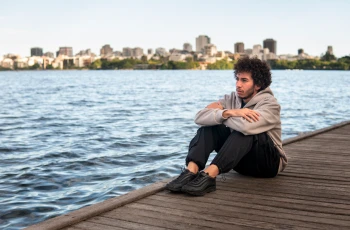What Is Online Therapy? Everything You Need To Know About e-Therapy
Written by the editorial staff writer at Hola. Medically Reviewed by Amira Shah, MA in Counselling Psychology, Registered Psychotherapist. Blog updated on 19 February, 2026. Originally published on 29 May, 2024.

Contents

Overview
Online therapy, often referred to as e-therapy or teletherapy, has gained significant popularity as a means of accessing mental health assistance. Numerous Australians are opting for online solutions due to their flexibility, confidentiality, and enhanced accessibility.
This format allows individuals to connect with qualified professionals without having to visit a clinic in person. This guide outlines how online therapy works, who it is suitable for, and its potential benefits.
What is online therapy
Online therapy is a method of providing mental health support remotely through digital technology. Rather than meeting in person, sessions are held via secure online platforms.
Online therapy may include:
- Video conferencing
- Telephone consultations
- Secure messaging or chat
- Structured online mental health programs
The objective of online therapy remains the same as that of in-person sessions: to offer support, guidance, and evidence-based treatment for mental health issues.
How online therapy work?
Typically, online therapy follows a straightforward process:
- Schedule an appointment with a qualified therapist
- Select a session format, such as video, phone, or chat
- Participate in sessions from home or another private location
- Continue with regular sessions based on your needs and objectives
Sessions are usually planned regularly, similar to traditional therapy, and can be adjusted as necessary.
Who provides online therapy?
Trained mental health professionals provide online therapy in Australia. These professionals may include:
- Registered psychologists
- Accredited mental health social workers
- Counsellors, depending on their credentials
Many therapists are registered with AHPRA or other relevant professional organisations and use secure platforms that comply with Australian privacy and data protection regulations.
What conditions can it help with?
Online therapy can assist with a variety of mental health issues, particularly mild to moderate conditions. Common areas of focus include:
- Anxiety and stress
- Depression and low mood
- Burnout related to work
- Relationship issues
- Grief and loss
- General emotional support and coping techniques
Online therapy vs in-person therapy
| Aspect | Online therapy | In-person therapy |
| Location | Anywhere with internet | Clinic-based |
| Convenience | High | Moderate |
| Accessibility | Suitable for rural and remote areas | Limited by location |
| Comfort | Home environment | Clinical setting |
| Effectiveness | Comparable for many conditions | Well established |
Benefits of online therapy
Online therapy provides several practical benefits:
- Flexible appointment scheduling
- No travel time or waiting areas
- Enhanced privacy and confidentiality
- Better access for individuals in rural and remote regions
- Easier integration with work, education, and family obligations
Limitations of online therapy
While online therapy can be effective for many individuals, it may not be appropriate for everyone. Limitations may include:
- The necessity for a reliable internet connection
- Reduced suitability during acute mental health crises
- Preference for in-person interactions by some individuals
Emergency mental health situations still require in-person or urgent care.
Feeling sick and unsure why? Talk to a doctor online, available 24/7
Is online therapy effective?
Research indicates that online therapy can be beneficial for various mental health issues1, especially when conducted by trained professionals. Effectiveness depends on several factors, including the severity of symptoms, the therapist’s experience, and the client’s active engagement in sessions.
Online therapy is particularly suitable for:
- Mild to moderate symptoms
- Early intervention
- Ongoing support and maintenance
Is online therapy safe and confidential?
Online therapy in Australia follows strict privacy and confidentiality regulations. Key aspects include:
- Sessions conducted on secure, encrypted platforms
- Compliance with Australian privacy legislation
- Confidentiality comparable to that of in-person sessions
Amira, a mental health expert, explains that therapists clearly outline the limits of confidentiality (for example, in situations involving safety concerns).
How to access online therapy in Australia
Typically, accessing online therapy involves the following steps:
- Consult a GP for assessment and recommendations
- Obtain a Mental Health Care Plan if eligible
- Schedule online therapy sessions with a qualified provider
- Claim Medicare rebates where applicable
When to see a GP first
It is advisable to see a GP before commencing therapy if:
- Symptoms are severe or worsening
- You are unsure about the most appropriate type of support
- You would like to obtain a Mental Health Care Plan
- You need to discuss medication options
- Your mental health is affecting your work and you require medical certificates
How Hola Health can help
Hola Health helps Australians conveniently access mental health services through secure and flexible telehealth options.
- Virtual GP consultations available throughout Australia
- Mental health assessments and guidance
- Mental Health Care Plans, where clinically appropriate
- Referrals to therapists available online or in person
- Medical certificates for mental health days
Conclusion
Online therapy offers a flexible and effective way to access mental health support, particularly for Australians seeking convenience and privacy. For many common concerns, it provides benefits comparable to traditional in-person therapy while removing barriers such as travel and scheduling difficulties.
Choosing the right type of support depends on individual needs, and professional help is available, confidential, and accessible when required.
FAQ
What distinguishes online therapy from online GP consultations?
Online therapy focuses on counselling and psychological treatment, whereas GP consultations involve medical assessments, referrals, treatment planning, and prescriptions where appropriate.
Is online therapy eligible for Medicare coverage in Australia?
Medicare rebates may be available if you have a valid Mental Health Care Plan and consult a qualified provider.
Can online therapy serve as a substitute for in-person therapy?
For many individuals and conditions, online therapy can be an effective alternative. However, certain complex or crisis situations may still require face-to-face care.
Is online therapy appropriate for anxiety or depression?
Yes, online therapy is commonly used for mild to moderate anxiety and depression and can provide structured, evidence-based support.
What should I do if I require immediate mental health assistance?
If you need urgent mental health support, seek immediate in-person care or contact emergency services or a crisis support hotline.
Feeling sick and unsure why? Talk to a doctor online, available 24/7
Reference
National Library of MedicineProviding consult for
- Cough
- Nausea & vomiting
- Fever
- Hayfever
- Fatigue
- Sore throat
- Acne
- Gout
- Eczema
- Rosacea
- Sunburn
- UTI
- Erectile dysfunction
- Contraception
- Morning sickness
- Morning after pill
- Prostate health
- Anxiety
- Depression
- Stress
- Grief & loss
- Premature ejaculation
- Asthma
- Blood pressure
- Diabetes
- Cholesterol
- Migraines & headaches
- Allergies
- Heartburn & reflux
- Sleep disorder
- Gastro
Related Articles
What Is Online Therapy? Everything You Need To Know About e-Therapy
Disclaimer
This blog is for general informational purposes only and does not indicate that Hola Health provides all treatments or preventive measures mentioned. It is not intended to be a substitute for professional medical advice. Always seek the guidance of your doctor or other qualified health professional with any questions you may have regarding your health or a medical condition. For emergencies please immediately contact 000. Any medical topics discussed are intended to educate, not to imply availability through Hola Health.




